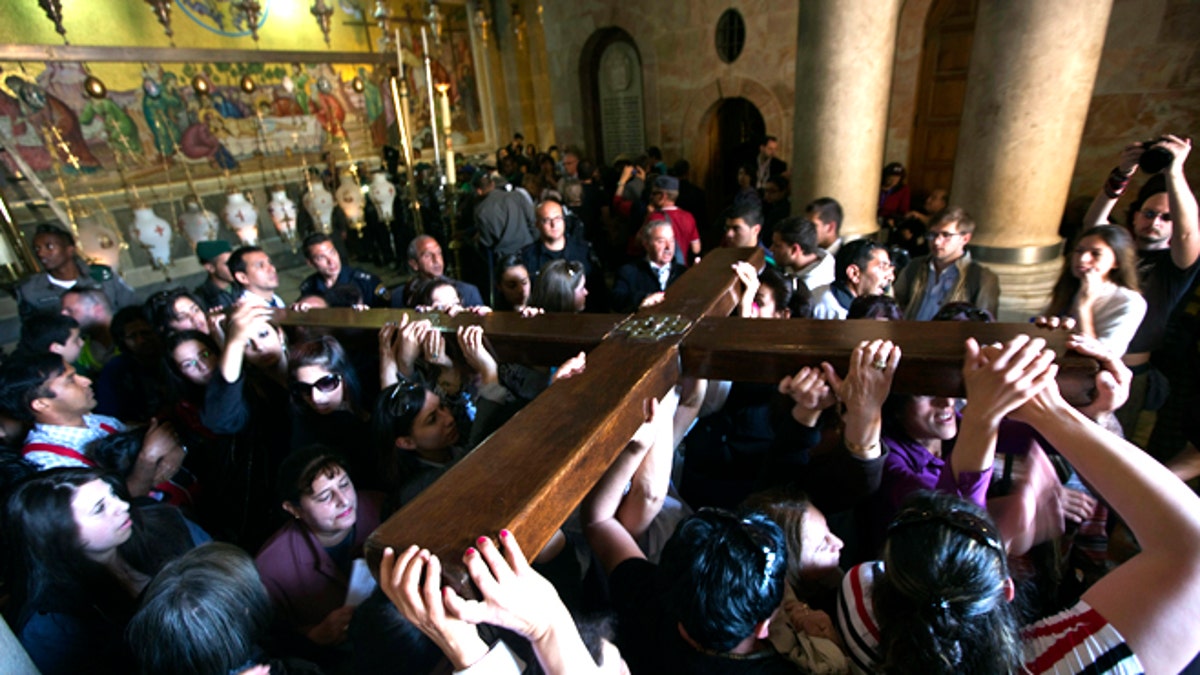
Worshippers carry a cross in the Church of the Holy Sepulchre on Good Friday during Holy Week, in Jerusalem's Old City. (Reuters)
As priests are abducted in Crimea, churches burn in Sudan, and American pastors waste away in North Korean prisons, how long will it take this administration to name a new ambassador-at-large for international religious freedom?
With the president visiting Saudi Arabia and the first lady visiting China earlier this month, April would have been a prime opportunity to send a message that America values religious freedom, even in the presence of necessary allies with dismal reputations in this regard. This isn’t a Democratic, Republican, liberal, or conservative issue; it’s a matter of common decency and of human rights.
[pullquote]
The ambassadorship has been vacant for six months and it has been nearly two months since President Obama stated at the National Prayer Breakfast that he “looks forward to nominating our next ambassador-at-large for international religious freedom.”
I have personally witnessed the shocking truth of the president’s related statement that "around the world, freedom of religion is under threat."
- Recently, I was in the West Bank where earlier this year in the village of Deir Istiya, attackers set fire to the local mosque and spray painted hate messages on its walls.
- The same day I was leaving the region, radical Islamists fired at least 40 rockets into the towns of their Jewish neighbors.
- A few weeks ago, as worshippers were gathering in St. Paul’s Roman Catholic Church in Nigeria, Boko Haram a militant group trying to overthrow the government and create an Islamic state, attacked the church and killed over 45 parishioners. One of the survivors lost her husband and child in the attack and when interviewed all she could say was, “we saw hell.”
- In the mainly Buddhist nation of Burma, the number of displaced Rohingya Muslims has climbed to more than 150,000; others have been killed at the hands of Buddhist mobs, and all of this has happened since Burma began making it’s move toward “political reform.”
-- In the Central African Republic, Christian militias are now responding with unspeakable violence against the mainly Muslim Seleka rebels who notoriously terrorized Christians in the country last year, and on a recent Sunday morning in Mombasa, Kenya, extremists killed 2 Christian church leaders as they sat in the pews of Joy Jesus Church.
- In February, police detained 120 people for attacking a mosque in Bulgaria, throwing stones through the windows and chanting anti-Muslim slogans.
The stories go on and on.
It was also nearly two months ago that I wrote a widely-read article highlighting Christian persecution in the Middle East. Since that article was published, thousands more Christians have been imprisoned, beaten, or massacred for their faith.
Every number has a name, every life matters, and a key part of calming religious conflict around the world is ensuring that the United States makes its position on religious freedom clear and takes that position seriously.
Up to this point, it seems questionable whether the Obama administration really cares about these issues at all.
Despite statements like the one made during the National Prayer Breakfast, it appears there has been little concerted effort to make religious freedom a priority.
During the same speech, President Obama specifically mentioned need for prayer for Kenneth Bae, an American citizen and Christian pastor being held in North Korea, and Saeed Abedini, another citizen and pastor currently imprisoned in Iran. And while I agree that praying for these men is essential, government officials can and should do more than just pray.
The oppressive regimes that imprisoned these men should be made aware that the United States will step in when issues of religious freedom are at stake, at the very least when its own citizens are being persecuted.
We should make it crystal clear to the world that freedom of religion is a human right that is not confined to our own citizens within the United States but is extended to those being persecuted beyond our borders.
This is one of the few issues where support comes from both sides of the aisle. Kentucky Republican Senator Rand Paul has stated, “I look forward to working with this Administration to ensure that our religious freedoms are protected,” and Joe Biden has confessed, “My religion defines who I am.”
The same is true of millions of people around the world. They deserve the freedom to worship as they choose without fear for their lives or for the lives of those they love.
If countries refuse to protect the right to worship freely, then they should know that custodians of freedom, like the United States, will be watching; protecting Jews as well as Christians, Muslims as well as Buddhists.
An ambassador-at-large for international religious freedom needs to be appointed now. Filling this position with the right person will send a clear message and it will save lives.
This person’s job will not be easy, for religious tension around the world is at a feverish pitch.
He or she will need the full support of Republicans and Democrats to ensure that nations will suffer consequences should they allow religious violence to run amok.
Nations which learn to respect religious freedom generally become politically stable, economically stronger, and provide greater protection and empowerment for women.
Religious freedom ensures a more stable and prosperous world for all.
It was Michelle Obama who said that faith “isn’t just about showing up on Sunday for a good sermon and good music and a good meal. It’s about what we do Monday through Saturday.”
Those are wise words, and words that can be applied to the president’s promise made at the National Prayer Breakfast.
The longer we wait, the longer the world questions whether religious freedom is truly an American priority.
Some decisions just aren’t partisan decisions.
This isn’t, and it’s urgent.








































